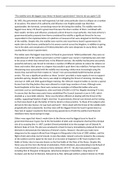“The nobility were the biggest issue Henry VII faced in government” How far do you agree? (25)
By 1485, the government was well-organised, but had come perilously close to collapse on a number
of occasions. The extent of its authority and influence over English people was therefore
questionable; the foremost, overarching reason for this being the nobility. The nobility were the
biggest issue Henry VII faced in government because the sheer number of them, combined with
their wealth, territory and influence, produced a direct threat to royal authority. One look at Henry’s
governmental policy presents how Henry considered the nobility a significant threat for he was
responsible for the implementation of a plethora of measures that were designed to limit the power
of the nobility. Despite this, the nobility were not the only issue Henry faced in government; his
weak claim to the throne contributed to his uneven control across the kingdom, in addition to giving
rise to the plots and conspiracies of Yorkist pretenders who were desperate to usurp Henry, both
causing Henry issues in government.
The nobles were the biggest issue Henry VII faced in government. Whilst problematic, they were an
imperative part of the nation’s governance as their support was crucial in maintaining law and order
in the areas in which they owned land. In the fifteenth century, the nobility had become excessively
powerful and Henry was forced to introduce a number of different policies to reduce his reliance on
them and restrict their power to a degree that wouldn’t push them into rebellion. Perhaps the most
threatening issue associated with the nobility was retaining; nobles were increasingly using the
money they earned from their estates to “retain” men and essentially build themselves private
armies. This was a significant problem as these “armies” provided a ready supply of men to support
potential uprising. Despite this, Henry was adept in mitigating the threat of retaining, introducing
new laws in 1485 and 1504 against illegal retaining; the 1504 Act required nobles to receive a special
license from the King before they were allowed to retain large numbers of men. Although some
found loopholes in the laws, there were numerous examples of influential nobles who were
convicted, such as Lord Burgavenny, who was fined £70,000 in 1507 for illegally retaining 471 men.
To ensure that the fines were paid, Henry established The Council Learned in Law in 1495, which
doubled as a royal debt collector. Henry was therefore efficient at dealing with the threat of the
nobility, supporting Polydore Vergil’s view that “in government, [Henry] was shrewd and far-seeing,
so that none dared to get the better of him by deceit or sharp practice. To those of his subjects who
did not do him due honour, he was hard and harsh”. Henry dealt with the threat of the nobility both
pragmatically and competently, but they were still the biggest threat he faced in government as
their lack of support resulted in them becoming perpetrators of both the political and financial
rebellions Henry faced during his reign.
Others may argue that Henry’s weak claim to the throne was the biggest issue he faced in
government because it gave rise to the formulation of plots and conspiracies that had the principal
aim of to usurping him. In 1487, Lambert Simnel pretended to be the younger son of Edward IV,
Richard, Duke of York. The plot was amateurish at best for Henry immediately produced the Earl of
Warwick to demonstrate the falseness of Simnel’s claims. However, the plot was made more
dangerous by the support offered from Margaret of Burgundy in the form of 2000 soldiers, and the
flight of John de la Pole, Earl of Lincoln, to join the rebels. Simnel’s arrival in Ireland in the company
of the soldiers was the signal for the start of an invasion of England in 1487 that resulted in the
Battle of Stoke, later to become known as the final battle of the Wars of the Roses. Despite this,
Henry was not free from the threat of pretenders. Perkin Warbeck, also pretending to be Richard of
York, presented himself as a threat to Henry between 1491-97. He also had powerful support,
including that of Margaret of Burgundy, Holy Roman Emperor Maximilian I, King James IV of
Scotland, and the Earl of Warwick, Edmund de la Pole. Although neither Lambert Simnel nor Perkin





